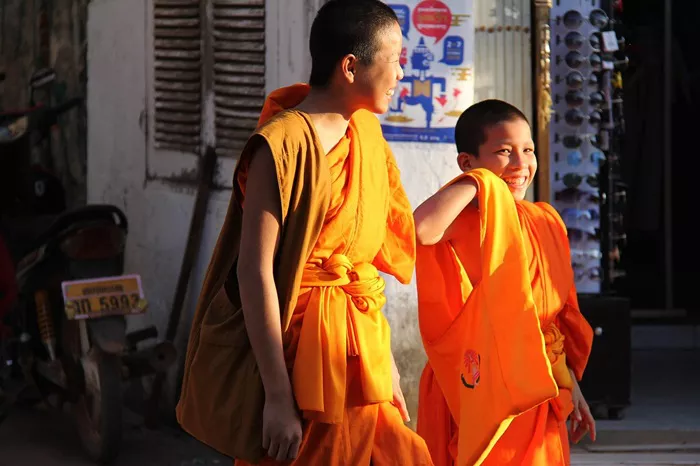Theravada Buddhism is one of the oldest forms of Buddhism. It has a long history and many followers, especially in Southeast Asia. Some people wonder if Theravada Buddhism is universal, meaning it can apply to all people everywhere, or if it is ethnic, meaning it is tied closely to certain cultures or ethnic groups. This article will explore this question in simple terms, drawing from Theravada Buddhism origin and history.
What Is Theravada Buddhism?
Theravada means “The Teaching of the Elders.” It is often called the “School of the Elders.” This form of Buddhism follows the earliest teachings of the Buddha, based on the Pali Canon, a very old set of Buddhist scriptures. Theravada emphasizes personal effort to reach enlightenment, or Nirvana, through meditation, moral conduct, and wisdom.
Theravada Buddhism is mainly practiced in countries like Sri Lanka, Thailand, Myanmar, Cambodia, and Laos. It focuses on preserving the original teachings of the Buddha. Many people respect its simplicity and clear path.
Theravada Buddhism and Ethnicity
Because Theravada Buddhism is widely practiced in specific countries, it can seem ethnic. In places like Thailand or Myanmar, Theravada Buddhism is closely connected to local culture, language, and traditions. For example, many festivals, rituals, and social customs in these countries are shaped by Theravada Buddhist beliefs.
Also, Theravada Buddhism has historically been passed down within these ethnic groups. Monks are often members of the local ethnic communities, and the scriptures are studied in local languages related to Pali. This cultural link can make Theravada feel like an ethnic religion to outsiders.
The Role of Culture
Cultural traditions in Theravada countries include merit-making ceremonies, offerings to monks, and respecting elders. These practices are influenced by local customs and help shape how Buddhism is lived day-to-day. For many people, Theravada Buddhism is part of their identity as a member of an ethnic group.
Still, it is important to understand that while Theravada Buddhism lives within these cultures, its core teachings aim beyond ethnic boundaries.
Theravada Buddhism as a Universal Teaching
At the heart of Theravada Buddhism are the teachings of the Buddha. These teachings are meant for all human beings, no matter their background, nationality, or ethnicity. The Buddha taught about suffering, its causes, and the path to end suffering. These ideas are universal problems and solutions that apply to anyone who seeks spiritual growth.
Theravada Buddhism offers a clear path to liberation through the Four Noble Truths and the Noble Eightfold Path. These teachings encourage people to develop wisdom, ethical behavior, and mental discipline, which are qualities that can benefit all humans regardless of culture.
The Spread Beyond Ethnic Borders
In recent decades, Theravada Buddhism has spread beyond its traditional ethnic homes. Many Western countries have Theravada meditation centers and temples. People from various ethnic backgrounds practice Theravada meditation, study its teachings, and even become monks.
This shows that Theravada Buddhism can adapt and be relevant to people of many different cultures. The spiritual path is open to anyone who wants to follow it, no matter where they come from.
The Role of Meditation and Practice
Meditation practice, a key part of Theravada, is a universal tool. It helps calm the mind and develop insight. People around the world, regardless of ethnicity, find meditation useful for improving their mental and emotional health. This practical aspect of Theravada Buddhism supports its universal appeal.
Balancing Universal Teachings and Ethnic Traditions
It is helpful to see Theravada Buddhism as having two parts. One part is the universal teachings of the Buddha, which apply to all people. The other part is the ethnic and cultural expressions of those teachings, which vary by region.
For example, a Thai person may celebrate Buddhist holidays with certain customs that are different from those in Sri Lanka or Myanmar. However, the basic teachings they follow are the same. This means Theravada Buddhism can be both ethnic and universal at the same time.
How Theravada Buddhism Adapts
As Theravada Buddhism grows worldwide, it adapts to new cultural settings. Monks teach the Buddha’s teachings in local languages and explain meditation in ways that new students can understand. This flexibility helps Theravada maintain its core while reaching diverse people.
Still, traditional customs remain important in many communities. Respecting these customs helps preserve the religion’s heritage and gives people a sense of belonging.
Common Misunderstandings
Some people think Theravada Buddhism is only for certain ethnic groups because they mostly see it in Southeast Asia. Others believe it is too traditional and cannot change. These ideas limit the understanding of Theravada’s true nature.
In reality, Theravada Buddhism offers universal wisdom and a practical path to freedom. At the same time, it respects the local cultures where it has grown. This balance is a strength, not a weakness.
Conclusion
Theravada Buddhism is both universal and ethnic. Its core teachings are universal truths meant for everyone, regardless of background. But the way these teachings are practiced often reflects the ethnic and cultural traditions of the countries where it has been strongest.
With the rise of global interest in meditation and Buddhism, Theravada is increasingly recognized as a universal spiritual path. Yet, it still honors the rich ethnic cultures that helped preserve its teachings for over two thousand years.

